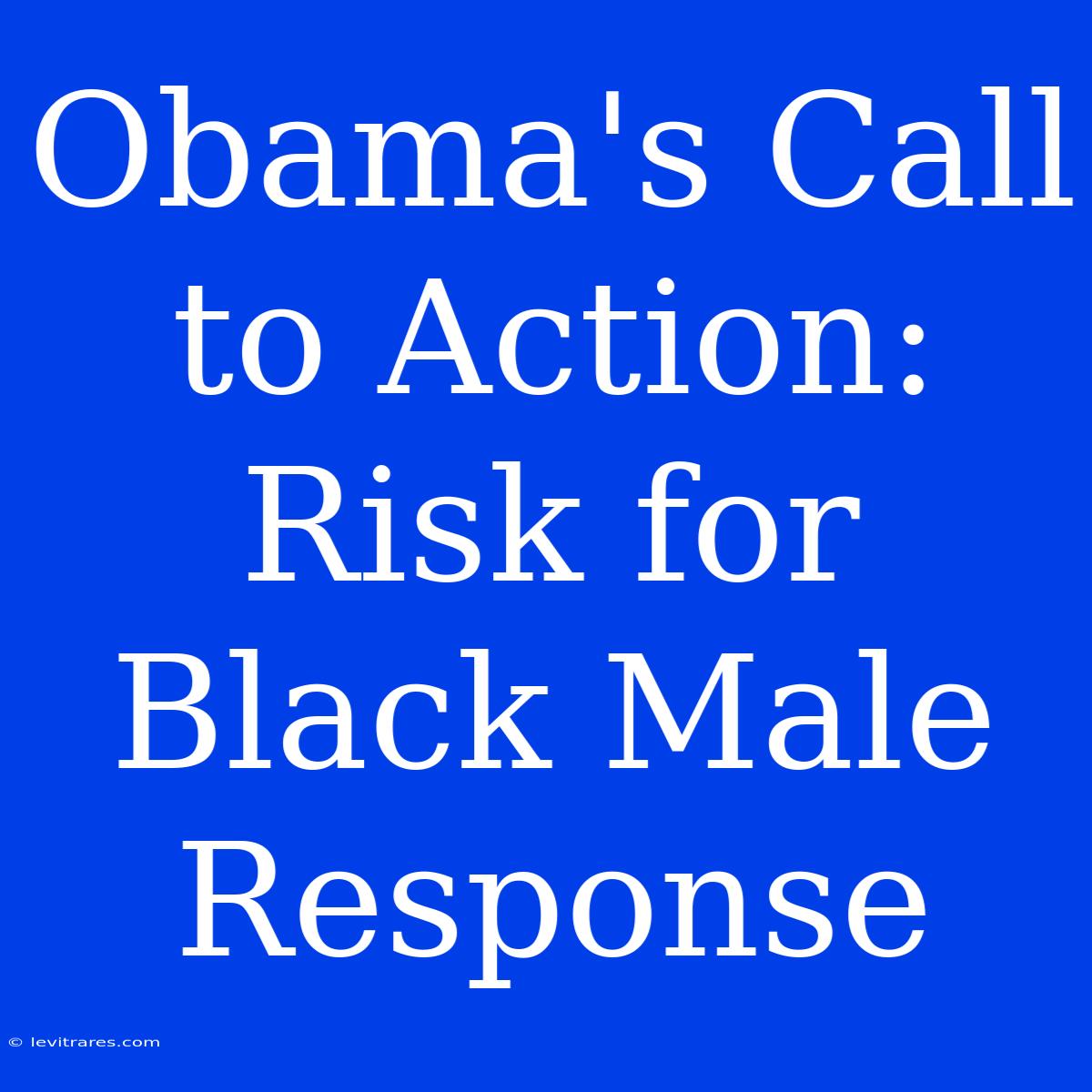Obama's Call to Action: Risk for Black Male Response
Can a powerful voice like Barack Obama's truly change the narrative for Black men in America? Obama's call to action isn't just a plea, it's a challenge. It's a question of whether his words can resonate with Black men facing systemic barriers and entrenched challenges. Editor Note: Obama's Call to Action: Risk for Black Male Response has been published today.
This topic is crucial because it touches on the heart of racial injustice, the struggles of Black men in America, and the potential for positive change. This article delves into the implications of Obama's call to action, exploring the specific risks involved in Black male response, the potential for impact, and the importance of understanding the unique context of this dialogue.
Analysis: We've analyzed Obama's speech, dissected the concerns and challenges faced by Black men, and sought expert opinions to create this comprehensive guide. We aim to provide clarity on the potential outcomes of responding to Obama's call and help readers understand the intricacies involved.
Key Takeaways:
| Takeaway | Description |
|---|---|
| Historical Context | Understanding the legacy of racial injustice impacting Black men today. |
| Social and Economic Barriers | Examining the systemic inequities hindering Black men's progress. |
| Cultural Perception | Exploring the impact of stereotypes and negative portrayals on Black men. |
| Risk of Tokenism | The potential for exploitation or misrepresentation in responding to calls. |
| Authenticity and Agency | The need for Black men to define their own responses and solutions. |
Obama's Call to Action
The Importance of Action: This call to action is significant due to its historical context. Coming from a former president who is also a Black man, it carries weight and a sense of shared experience. Obama's words resonate with the need for change, urging Black men to engage in proactive solutions.
Key Aspects:
- Historical context: Recognizing the legacy of slavery, Jim Crow, and systemic racism as contributing factors to the current state of Black men in America.
- Social and Economic Barriers: Addressing the challenges of poverty, unemployment, lack of educational opportunities, and the disproportionate impact of mass incarceration on Black men.
- Cultural Perception: Challenging negative stereotypes and seeking to redefine narratives that perpetuate harmful misconceptions about Black men.
- Risk of Tokenism: Highlighting the potential for Black men to be used as symbols of progress while not addressing the underlying issues.
- Authenticity and Agency: Emphasizing the importance of Black men being active participants in shaping their own solutions and narratives.
Responding to the Call:
Responding to Obama's call is a complex decision, requiring careful consideration of the risks and opportunities involved.
Risk of Tokenism: The call to action carries the risk of perpetuating tokenism, where Black men are seen as representatives of their race rather than individuals with unique perspectives and experiences. This can lead to exploitation and misrepresentation, undermining the broader movement for equality.
Authenticity and Agency: Black men must prioritize their own agency and authenticity in responding to Obama's call. This means actively engaging in discussions, shaping solutions that resonate with their lived experiences, and ensuring their voices are heard without being manipulated or co-opted.
Looking Ahead:
Obama's call to action is a catalyst for dialogue and action. While the risks are real, the potential for positive change is equally substantial. By understanding the complexities of the situation, embracing authenticity, and working together, Black men can forge a path towards a more equitable future.
FAQ
Q: Why is Obama's call to action so important? A: It comes from a respected figure who embodies the experiences of Black men in America, prompting deeper engagement with systemic issues.
Q: What are some of the risks associated with responding to the call? A: The risk of tokenism, where individuals are used as symbols of progress without addressing underlying issues, is a key concern.
Q: How can Black men ensure their responses are authentic? **A: ** By defining their own solutions, taking ownership of their narratives, and engaging in dialogues that prioritize their lived experiences.
Q: Is this call to action just for Black men? A: No, it calls for everyone to engage in critical conversations about race and equality, fostering a broader understanding of the challenges faced by Black men.
Q: What are some practical steps that Black men can take? A: Active involvement in community organizations, supporting Black-owned businesses, and engaging in open dialogues about race and inequality are vital steps.
Tips for Black Male Response:
- Understand Your History: Educate yourself on the historical context of racial injustice and its impact on Black men.
- Engage in Dialogue: Seek out conversations with other Black men and allies to discuss challenges and solutions.
- Support Black-Owned Businesses: Invest in and promote businesses owned by Black individuals, creating economic opportunities.
- Be Active in Your Community: Participate in local organizations that advocate for social justice and equality.
- Embrace Your Identity: Own your identity and challenge stereotypes that perpetuate negative narratives.
Summary:
Obama's call to action is a powerful message, demanding recognition of the historical context, social and economic barriers, and cultural perception that continue to impact Black men in America. It calls for proactive solutions, while acknowledging the risks involved. By prioritizing authenticity, engaging in meaningful dialogue, and actively participating in solutions, Black men can navigate these challenges and contribute to a more equitable society.
Closing Message: This call to action presents an opportunity for Black men to reclaim their narratives and forge a path towards a future where their contributions are recognized, their voices are heard, and their potential is fully realized.

